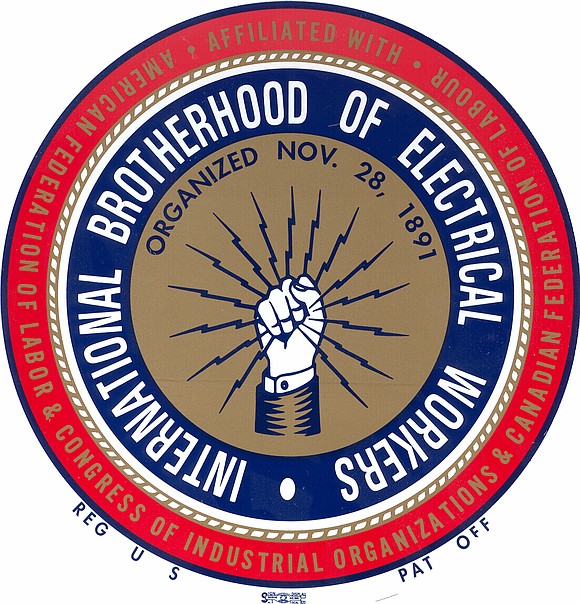Business Manager Tony Sapienza
IBEW 1837 Makes Rare Endorsement in Maine Gov. Race
October 8, 2010 - When a Maine union local with more than 1,000 members endorses a candidate for Governor, it’s a pretty big deal. It’s an even bigger deal when it’s a union local that rarely makes endorsements.
At the meeting of our IBEW 1837 Executive Board in Manchester on August 20, our elected unit representatives voted overwhelmingly to endorse Libby Mitchell for Governor. The decision was made largely because of Mitchell’s support for workers throughout Maine, but in particular, her support for members of our own union.
"Our Local Union E-Board generally hasn't made endorsements of individual candidates, but they couldn't overlook the tremendous work that Libby Mitchell has done on behalf of our members,” IBEW 1837 Business Manager Cynthia Phinney said. “Time after time, when we went looking for help on critical issues that could directly impact our members, Libby answered the call and went the extra mile to help us out.”
At Portland television station WGME 13, workers suffered wage cuts of up to 10% from Sinclair Broadcasting Group, a largely non-union company with a demonstrably anti-union track record. The company unilaterally declared impasse in union contract negotiations and implemented parts of their “last and final” contract offer.
After meeting with union representatives, Libby Mitchell showed her solidarity for IBEW #1837 members at WGME 13 by refusing to air campaign ads on the station during the Democratic gubernatorial primary campaign. (Campaign staffers for Republican Paul LePage said he didn’t have time to meet with union representatives and independent candidate Eliot Cutler said he didn’t want to “take sides during a labor dispute.”) The television station responded to the loss of ad revenue by airing a blistering attack in the form of an editorial accusing Mitchell and the other Democratic candidates of making their decision “without all the facts.”
"We have the facts," Mitchell told the Kennebec Journal. "There's an ongoing labor dispute. I simply chose not to purchase advertising time during the primary until that dispute was worked out. I would not cross a picket line either."
At Central Maine Power Company, the Spanish corporation Iberdrola took a “hands off” approach to negotiations as their management team demanded concessions in healthcare and retirement benefits. Workers voted down CMP’s so-called “final offer” by a wide margin and authorized the negotiating team to call a strike.
CMP workers and union representatives reached out to Libby Mitchell as part of an effort to pressure CMP and Iberdola to make a fair contract offer. Taking time out from her legislative responsibilities as Maine’s Senate President, Libby sat down with the workers and asked how she could help. Working together, they agreed that Libby would contact Governor Baldacci’s office and urge him to use his relationship with Iberdrola’s President to resolve the situation quickly, and in a way that gave CMP workers a fair deal.
Meanwhile, some 141 CMP workers found out their jobs were threatened by the company’s decision to use $96 million in federal stimulus funding to install so-called “smart meters.” The Automated Metering Infrastructure technology (AMI) has some potential benefits, but it eliminates the need for meter readers and other related positions at CMP.
When the Maine Legislature’s Energy and Utilities Committee took up “Smart Grid” legislation to modernize parts of our electrical infrastructure and improve opportunities for energy savings, an amendment was introduced by labor allies that would offer retraining and other benefits to workers who were displaced by new technologies. But at least one Democratic committee member who supported the overall legislation sought to scuttle the amendment to help displaced workers, fearing that the needs of workers might delay the technological advances. That’s when IBEW paid another visit to the office of Senate President Libby Mitchell.
“Libby drew a line in the sand,” IBEW 1837’s Bill Dunn said. “She made it clear that the Smart Grid legislation was going to have a tough time making it through the Senate unless it took care of the workers first.”
Opposition to the displaced workers amendment quickly faded away, and company negotiators for CMP seemed to notice that IBEW had some pretty powerful friends at the Statehouse. Contract negotiations between the union and CMP were going on at the same time on the same day as the Smart Grid committee hearings, and just a few miles apart in Augusta.
“Libby was a great advocate for us at the Statehouse,” Brother Dunn continued. “The key fact of that support helped us get a better AMI provision in our contract with CMP.”
Although the final contract ratified by IBEW members at CMP fell short of what many workers wanted, it included an enhanced severance package and even retraining for some of the 141 workers who may lose their jobs due to smart meters.
All working men and women in Maine will continue to confront a challenging economic landscape for some time yet, and many of the members in our local hope that Libby Mitchell winds up in the Blaine House to help guide us through it.
“We know that if Libby is elected Governor, we'll be able to count on her to give workers and their unions a place at the table and a voice in the difficult issues that Maine is facing,” Sister Phinney said.
